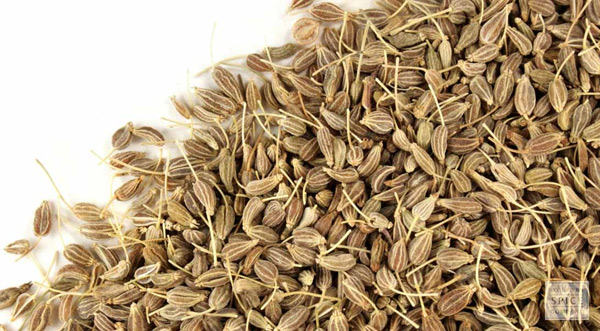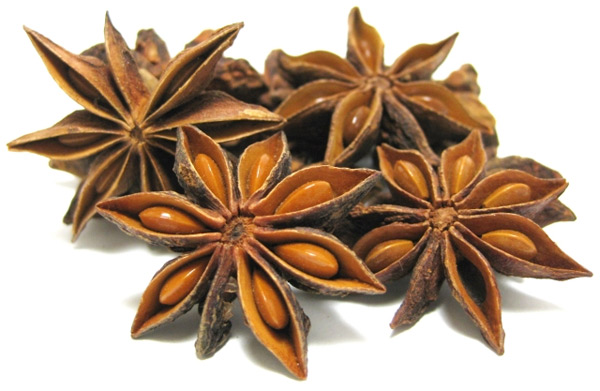
The Wonder Aphrodisiac Herb for Women with Multiple Health Benefits
Anise is an herb. The seed (fruit) and oil, and less frequently the root and leaf, are used to make medicine. Anise is a perennial herbal plant; generally, grows up to a height of about 2 feet. It bears white colored umbelliform flowers by July, and is harvested by cutting the whole plant once the seeds ripened. Then the seeds are separated from the flower heads by threshing method. The seeds feature oblong or curved like comma shape, about 3-4 mm long, light brown color and fine stripes over its outer surface.
Throughout history, people have used aniseed to treat a variety of ailments. The greenish seeds of the Pimpinella anisum were a highly-prized commodity in ancient Greece and Rome, and the seeds were so valuable in the East that they were often used to pay taxes. Today, the seeds continue to help people around the world with ailments ranging from digestive issues to low libido.
The seeds feature delicately sweet and aromatic bouquet with a distinctive liquorice flavor. The special fragrance is due to essential oil, anethole in them. Star anise is the spicy fruit, obtained from evergreen tree native of South-West China. It has similar flavor and taste like that of anise seed. The tree bears star-shaped fruits, which turn rust-red color when ripen and envelope inside amber-colored seeds. Both the seed as well as the husks are used as spice in cooking.
The seeds are composed of 18 percent proteins, eight to 23 percent fatty oils, two to seven percent essential oils, five percent starch, 22 to 28 percent N-free extracts and 12 to 25 percent crude fibre. The remaining nine to 13 percent of the seed’s weight is moisture.
Aniseeds are delightfully fragrant due to their high concentration of anethole, an essential oil. The seeds also contain other important compounds like acetophenone, p-anisaldehyde, anise alcohol, estragol, limonene and pinene.
The seeds are an excellent source of minerals like iron, magnesium, calcium, manganese zinc, potassium and copper. These minerals are essential to cardiac, bone and blood health and are needed by the body to turn food into energy.
The B-complex vitamins found in aniseed are essential to overall health. Loaded with riboflavin, pyridoxine, niacin and thiamin, the seeds can contribute to healthy levels of neuro-chemicals in the brain.
Anise is used for upset stomach, intestinal gas, “runny nose,” and as an expectorant to increase productive cough, as a diuretic to increase urine flow, and as an appetite stimulant.
Women use anise to increase milk flow when nursing, start menstruation, treat menstrual discomfort or pain, ease childbirth, and increase sex drive. Men use anise to treat symptoms of “male menopause.” Other uses include treatment of seizures, nicotine dependence, trouble sleeping (insomnia), asthma, and constipation. Some people apply anise directly to the skin to treat lice, scabies, and psoriasis.
In foods, anise is used as a flavoring agent. It has a sweet, aromatic taste that resembles the taste of black licorice. It is commonly used in alcohols and liqueurs, such as anisette and ouzo. Anise is also used in dairy products, gelatins, meats, candies, and breath fresheners. In manufacturing, anise is often used as a fragrance in soap, creams, perfumes and sachets.

There are chemicals in anise that may have estrogen-like effects, which enhances the low libido in women.
The seeds and the oil they produce contain thymol, terpineol and anethole, which can be used to treat pectoral affections and coughs. When used as a lozenge, aniseed is an effective expectorant. Bronchial irritation can be soothed by drinking a tea made from the seeds, and people that suffer from spasmodic asthma may also find relief from the seeds. Drops of aniseed oil may be used in a vaporizer to clear congestion and soothe coughing. Gargling with a tea made of the seeds can also provide relief for sore throat, laryngitis or pharyngitis.
The seeds have also been used to reduce flatulence, cure sleeplessness, aid nursing mothers with the production of milk and to stimulate appetite. Aniseed can also improve digestion, alleviate cramps and reduce nausea.
A paste made from the seeds may be applied to the forehead, neck or temples to relieve headaches and migraines. A similar paste can be used to treat lice and scabies.
Some components of aniseed are known to have calming effects that can relieve anxiety and nervousness. These components include thymol, stigmaterol, linalol, terpineol, alpha-pineno and eugenol.
Anise has aphrodisiac properties that can increase libido. Drinking one glass of water infused with the crushed seeds each night can increase one’s sex drive. The seed’s healing properties can also be yielded through external means like vaporization and pastes.
Health benefits of Anise
Exotic anise spice contains some of the important plants derived chemical compounds that are known to have been anti-oxidant, disease preventing, and health promoting properties.
The chief component that gives the characteristic sweet, aromatic flavor to anise is anethole, the essential volatile oil present in the seeds. Other important compounds found in these seeds include estragol, p-anisaldehyde, anise alcohol, acetophenone, pinene and limonene.
Anise seed oil obtained from extraction of the seeds is found application in many traditional medicines as stomachic, anti-septic, anti-spasmodic, carminative, digestive, expectorant, stimulant and tonic.

The seeds are an excellent source of many essential B-complex vitamins such as pyridoxine, niacin, riboflavin, and thiamin. Pyridoxine (vitamin B-6) helps increase GABA neuro-chemical levels in the brain.
The spicy seeds are the great source of minerals like calcium, iron, copper, potassium, manganese, zinc and magnesium. 100 g dry seeds contain 36.96 mg or 462% daily required levels of iron. Potassium is an important component of cell and body fluids that helps control heart rate and blood pressure.
Copper is a cofactor for many vital enzymes, including cytochrome C-oxidase and superoxide dismutase (other minerals function as cofactors for this enzyme are manganese and zinc). Copper is also required in the production of red blood cells.
The spice also contains good amounts of anti-oxidant vitamins such as vitamin-C and vitamin-A.
Medicinal use of Anise seed
Anise seed as well its oil have found application in many traditional medicines for their distinctive health promoting and disease preventing roles.
Anise preparations are an excellent remedy for asthma, bronchitis cough as well as digestive disorders such as flatulence, bloating, colicky stomach pain, nausea and indigestion.
The essential oil comprises 75 – 90% anethole, which has an observed estrogenic effect. The decoction obtained from the seeds oftentimes is prescribed in the nursing mothers to promote breast-milk production.
Anise seed water is very helpful in relieving running nose condition in infants.
The seeds are chewed after a meal in India to refresh the breath.
Culinary uses of Anise
Anise seeds, oil as well as fresh young leaves are used in cooking. The flavor is heightened by dry-frying the seeds. Anise is used in savory and sweet dishes to which it imparts sweet-aromatic flavor to variety of cuisines. The whole seeds and often-times freshly grounded powder added to the recipes at the last moment to limit the evaporation of essential volatile oils in them.

This delicate spice is being used as flavoring base for soups, sauces, breads, cakes, biscuits and confectionery.
Popular aniseed flavor drinks include prenod, french pastis, spanish ojen etc.
Anise seeds as well as its oil have been in use in the preparation of sweet dishes in many Asian countries.
It is used as a flavoring base in the preparation of herbal tea; and a liquor called anisette.
Star anise (bajiao) is one of the most important spices in Chinese cuisine, and it is the dominant flavor in Chinese five-spice powder along with cloves, cinnamon, huajiao (Sichuan pepper) and ground fennel seeds.
More Health benefits of Anise
Anise is anti-spasmodic in nature and is very effective in several situations or ailments caused by spasms, such as cramps, coughs, aches, diarrhea, nervous afflictions and convulsions.
Anise contains several essential minerals like calcium, iron, copper, potassium, manganese zinc and magnesium. Potassium present in anise is an important constituent of cell and body fluids that helps control heart rate and blood pressure.
Anise is rich in copper which is a cofactor for many vital enzymes, including cytochrome C-oxidase and superoxide dismutase. It is highly essential for the production of red blood cells.
Anise oil has narcotic and sedative properties which help in calming down epileptic and hysteric attacks by slowing down the process of circulation, respiration and nervous response. It is also quite effective in sedating nervous afflictions, hyper reactions and convulsions.
Anise or anise oil has anti-septic properties and can be very effective in protecting against infections and septic. It further helps in accelerated healing of wounds.
Anise can provide immense relief from rheumatic and arthritic pains by stimulating blood circulation and reducing sensation of pain in the affected areas.
Anise is commonly used for promoting digestion. It is a common practice to chew anise seeds or serve desserts containing anise to aid digestion, especially after a heavy meal or feast.
Anise has narcotic or numbing effects and can be used as a sedative for anxiety, nervous afflictions, depression, anger, stress etc. It is also used against insomnia due to its tranquilizing and relaxing effects.
The antibacterial and antimicrobial properties of anise make it an effective mouthwash and it fights against bad breath and other oral inflammations.
The seeds are extremely beneficial for both men and women by increasing libido. They are useful for reducing menstrual pains, inducing menstruation and treating cardiovascular functions, frigidity and impotence.
Anise is a great stimulator as it helps in stimulating circulation and providing relief from rheumatism and arthritis. It also boosts the secretion of enzymes and hormones, thereby stimulating the whole metabolism. As such, it stimulates the nervous system and brain to make us more active and alert.
Anise oil acts as a good expectorant by helping in loosening cough or phlegm deposited in the lungs and respiratory tracts, thereby bringing relief from cough, heaviness in the chest, breathing troubles, asthma, bronchitis, congestion and other respiratory disorders.
Hope the above resource brings an insight to our readers about Anise and its immense health benefits.